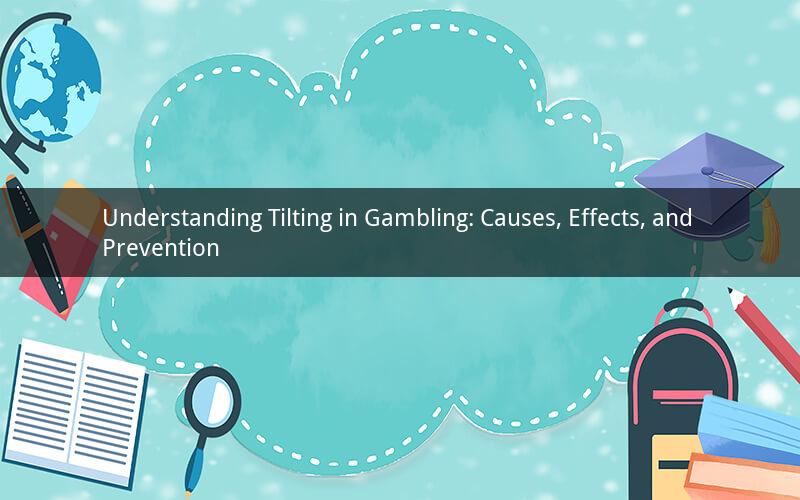
Introduction:
Gambling is an activity that involves betting on the outcome of an event, with the aim of winning money or prizes. While it can be an enjoyable pastime for many, it also carries the risk of addiction and negative consequences. One common issue that gamblers face is tilting, which can significantly impact their decision-making and overall experience. In this article, we will delve into what tilting is, its causes, effects, and ways to prevent it.
What is Tilting in Gambling?
Tilting, also known as "tilt," is a term used to describe a state of emotional or mental impairment that can occur in gamblers. It is characterized by a loss of control over one's actions and a tendency to make irrational decisions. When a gambler is tilted, they may become aggressive, impulsive, or overly confident, leading to poor decision-making and potentially harmful outcomes.
Causes of Tilting:
1. Emotional Distress: Emotional stress, such as financial problems, relationship issues, or personal losses, can trigger tilting in gamblers. The stress can make them more susceptible to making irrational decisions and losing control over their gambling behavior.
2. Negative Experiences: A series of losses or a particularly bad experience at the gambling table can lead to tilting. The frustration and disappointment can make gamblers feel compelled to keep playing, even when they know it is not in their best interest.
3. Overconfidence: Gamblers who believe they have a higher chance of winning than they actually do may become overconfident, leading to tilting. This overconfidence can cause them to take excessive risks and make poor decisions.
4. Lack of Sleep: Insufficient sleep can impair cognitive functions and emotional regulation, making gamblers more prone to tilting. Fatigue can lead to poor decision-making and increased impulsivity.
Effects of Tilting:
1. Financial Loss: Tilting can lead to significant financial losses, as gamblers may make irrational decisions and take excessive risks. This can result in a depletion of their bankroll and potential long-term financial problems.
2. Relationship Strain: Tilting can strain relationships with family and friends, as gamblers may become aggressive, moody, or secretive. This can lead to conflict and emotional damage.
3. Increased Risk of Addiction: Tilting can exacerbate gambling addiction, as gamblers may feel compelled to keep playing in order to recoup their losses. This can lead to a cycle of addiction and further negative consequences.
4. Mental Health Issues: Tilting can contribute to mental health issues, such as depression, anxiety, and substance abuse. The stress and frustration of tilting can take a toll on a person's mental well-being.
Preventing Tilting:
1. Set Limits: Establishing and sticking to gambling limits can help prevent tilting. This includes setting a budget, time limits, and self-exclusion policies.
2. Take Breaks: Regular breaks from gambling can help maintain a clear mind and prevent tilting. It allows gamblers to step back and evaluate their behavior.
3. Seek Support: Talking to friends, family, or a professional can provide emotional support and help gamblers recognize the signs of tilting. Support groups and counseling can also be beneficial.
4. Practice Self-Care: Maintaining good physical and mental health can help prevent tilting. This includes getting enough sleep, exercising, and engaging in stress-reducing activities.
5. Stay Informed: Educating oneself about the risks and consequences of gambling can help prevent tilting. Understanding the odds and the potential for addiction can make gamblers more aware of their behavior.
FAQs:
1. Q: Can tilting be prevented?
A: Yes, tilting can be prevented by setting limits, taking breaks, seeking support, practicing self-care, and staying informed about the risks of gambling.
2. Q: How can I recognize if I am tilted?
A: Signs of tilting include feeling aggressive, impulsive, or overly confident, making irrational decisions, and experiencing a loss of control over your gambling behavior.
3. Q: Is tilting a mental health issue?
A: Yes, tilting is a mental health issue that can lead to negative consequences, such as financial loss, relationship strain, and increased risk of addiction.
4. Q: Can tilting be treated?
A: Yes, tilting can be treated through various methods, including counseling, support groups, and self-help strategies.
5. Q: Is it normal to feel tilted after a loss?
A: While it is normal to feel frustrated or disappointed after a loss, feeling tilted to the extent of losing control over your behavior is not normal. It is important to address these feelings and seek support if needed.